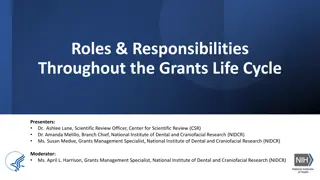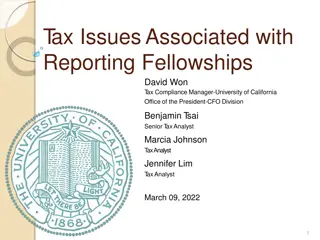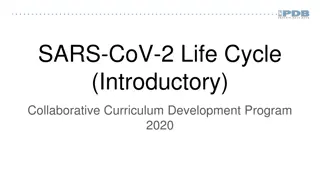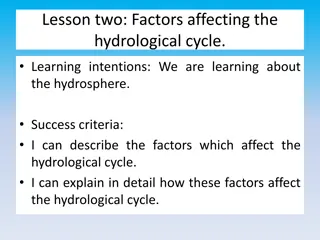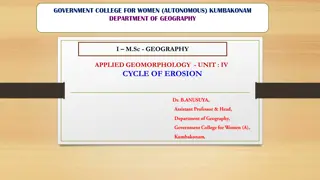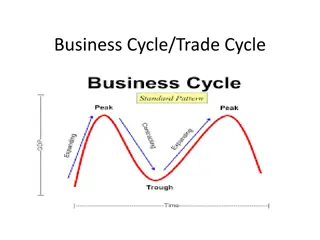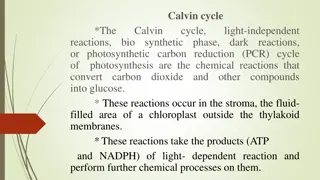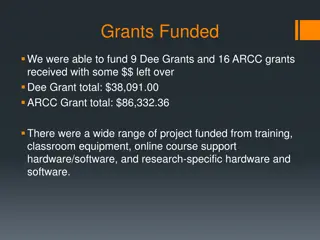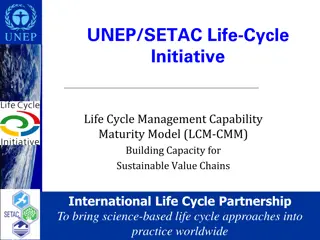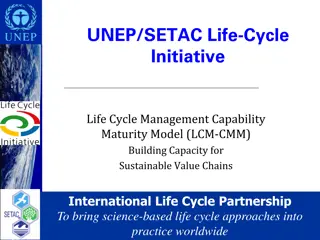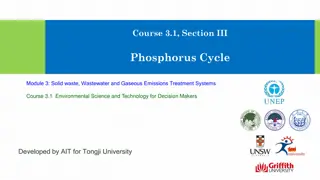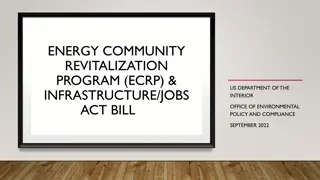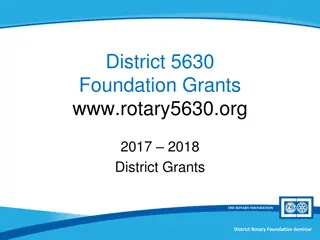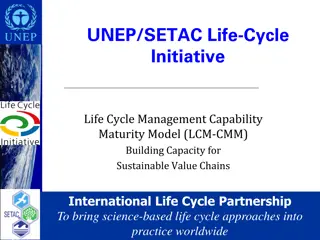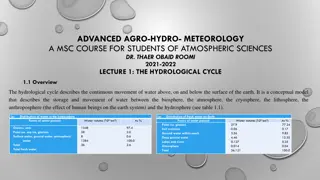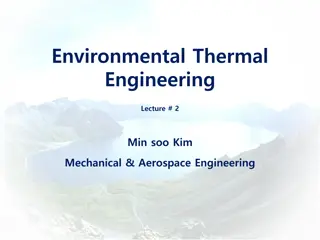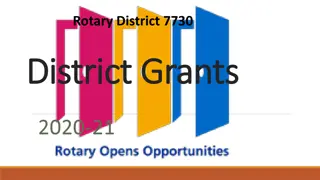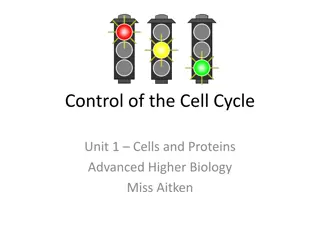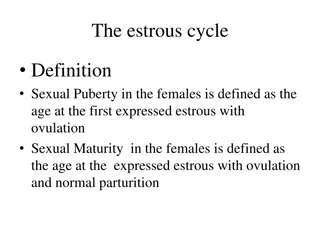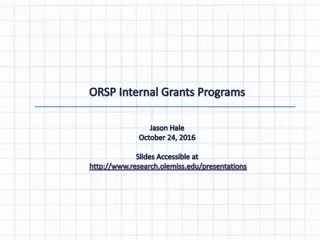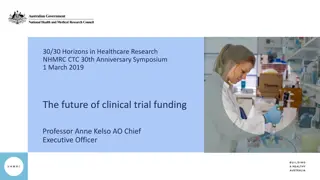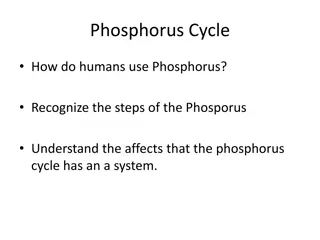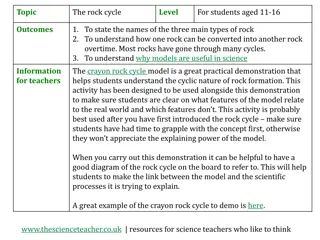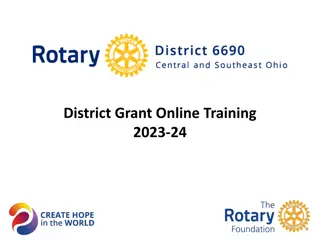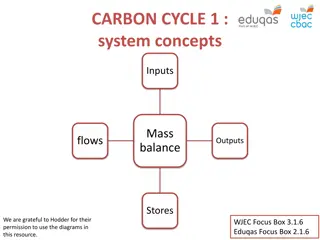Understanding Product Life Cycle Costing: A Comprehensive Analysis
Lifecycle costing involves tracking cost records of assets throughout their entire lives, optimizing asset usage at minimal cost. Product lifecycle costing accumulates a product's costs from inception to disposal, with stages like Introduction, Growth, Maturity, and Decline. It helps assess profitab
4 views • 19 slides
Roles and Responsibilities in the NIH Grants Life Cycle
Explore the key players involved in the grants life cycle at NIH, including scientific review officers, program officers, and grants management specialists. Learn when and how to seek help or advice from the NIH throughout the different stages of the process, from application submission to post-revi
0 views • 20 slides
Understanding Tax Reporting for Fellowship Grants at UC
This presentation addresses tax reporting issues associated with fellowship grants for UC graduate students. It explains the treatment of fellowship grants for income tax purposes, distinguishing between compensatory and non-compensatory grants. It also clarifies the taxable and nontaxable aspects o
0 views • 43 slides
Understanding the SARS-CoV-2 Life Cycle: An Overview
SARS-CoV-2, the virus responsible for COVID-19, follows a complex life cycle involving viral attachment and entry, replication and synthesis, as well as viral assembly and release. The virus interacts with host cell proteins to enter, produce essential proteins and RNA for reproduction, and then ass
1 views • 5 slides
Factors Affecting the Hydrological Cycle: Understanding Physical and Human Influences
The hydrological cycle is influenced by both physical and human factors. Physical factors such as relief, vegetation, basin size, rock type, soil type, and climate all play a role in shaping the movement of water through the cycle. Human activities like forestry, urbanization, deforestation, mining,
2 views • 20 slides
Understanding the Accounting Cycle Process
The accounting cycle is a comprehensive process that involves recording and processing all financial transactions of a company, from their occurrence to their representation in financial statements and closing of accounts. It is crucial for bookkeepers to manage the entire cycle, which includes step
0 views • 11 slides
Urea Biosynthesis and the Krebs-Henseleit Cycle in the Liver
Urea is synthesized in the liver through a series of enzymatic steps known as the urea cycle or Krebs-Henseleit cycle. This process involves converting toxic ammonia into urea, a less toxic and water-soluble compound that can be easily excreted in urine. The liver plays a crucial role in urea biosyn
1 views • 20 slides
Understanding the Cycle of Erosion: Applied Geomorphology Perspective
The Cycle of Erosion model, developed by Davis in the 1880s, explores the process of landmass upliftment, river erosion, and landscape transformation. The Normal Cycle of Erosion focuses on fluvial processes as the primary geomorphic agent, leading to the formation of peneplains. This cycle progress
0 views • 23 slides
Understanding the Accounting Cycle
The accounting cycle is a comprehensive process that involves recording and processing all financial transactions of a company, from their occurrence to their representation on financial statements and closing the accounts. This cycle, essential for bookkeepers, includes steps like transactions, jou
0 views • 11 slides
Student Budgeting Advice Service Information Session
Student Budgeting Advice Service provides one-to-one support for university students to manage their finances effectively. They offer guidance on fees, grants, and social welfare entitlements, along with information on internal and external financial supports. The service also assists students in un
1 views • 21 slides
Understanding the Business Cycle and Its Phases
The business cycle, also known as the trade cycle, depicts the cyclical nature of economic activity with alternating periods of prosperity, recession, depression, and recovery. It involves fluctuations in production, prices, income, employment, exports, and imports. The cycle affects all industries
1 views • 15 slides
Grants Support Committee Update May 2018
The Grants Support Committee provided updates on activities from November 2017 to May 2018, including virtual meetings, revised terms of reference, and collaboration on EU-funded projects. The committee established a document repository for key documents and produced a Grants Report detailing active
0 views • 8 slides
Understanding the Calvin Cycle in Photosynthesis
The Calvin cycle, also known as the light-independent reactions, is a crucial part of photosynthesis where carbon dioxide is converted into glucose. This cycle occurs in the stroma of chloroplasts and utilizes ATP and NADPH from the light-dependent reactions to produce sugars for plants. It consists
5 views • 15 slides
Ideal Reheat Rankine Cycle Analysis for Steam Power Plant
Analyzing the thermal efficiency and mass flow rate of an ideal Rankine cycle with superheat and reheat using steam as the working fluid. The cycle involves stages of expansion, reheating, and condensing to generate a net power output of 100 MW. Detailed calculations for states of the cycle are prov
1 views • 5 slides
Adapting Contest Strategies for Declining Solar Cycle 24 and Solar Cycle 25 Precursors
As Solar Cycle 24 rapidly declines, preparations for the subsequent Solar Cycle 25 are crucial. Insights on weak solar activity, potentially weak Cycle 25, and the impact on contest strategies are discussed. Improved DX propagation, reliable openings, and signal strengths to Europe and Japan, amidst
0 views • 12 slides
Funding Summary for Dee and ARCC Grants
A total of 9 Dee Grants and 16 ARCC Grants were successfully funded, with a surplus budget remaining. The Dee Grant total amounted to $38,091.00, while the ARCC Grant total reached $86,332.36. Projects funded included training, classroom equipment, online course support hardware/software, and resear
0 views • 9 slides
Recognizing Patterns of Dating Violence and the Cycle of Abuse
Understanding the phases of dating violence is crucial in recognizing and addressing abusive behavior. The cycle typically begins with tension building, leading to an explosion of abuse in various forms. This is followed by a honeymoon phase where the abuser apologizes and makes promises. However, t
0 views • 6 slides
Sustainable Value Chains and Life Cycle Management Capability
The UNEP/SETAC Life-Cycle Initiative focuses on building capacity for sustainable value chains through the Life Cycle Management Capability Maturity Model (LCM-CMM). It emphasizes implementing science-based life cycle approaches globally by transitioning from events to management systems, conducting
1 views • 12 slides
Icelandic Research Fund 2015: Enhancing Scientific Research and Education
The Icelandic Research Fund (IRF) aims to enhance scientific research and education in Iceland by awarding funding to research projects led by individuals, teams, universities, research institutes, and companies. Principal investigators must have completed graduate studies and experience in running
0 views • 22 slides
Life Cycle Management for Sustainable Value Chains: Building Capacity and Promoting Innovation
This content delves into the Life Cycle Management Capability Maturity Model (LCM-CMM) aimed at enhancing sustainable value chains globally. It emphasizes the importance of bringing science-based life cycle approaches into practical implementation to address global issues, international standards, c
1 views • 11 slides
Understanding the Role of Authorized Representatives in Grants Management
Authorized Representatives (AR) play a crucial role in managing grants by overseeing program compliance, decision-making, budget approvals, and reporting requirements. They ensure funds are used appropriately, monitor grantee progress, and implement state and federal regulations to meet program goal
0 views • 28 slides
Fuel Cycle Analysis Toolbox: Enhancing Understanding and Optimization
This presentation focuses on the analyses and evaluations essential for assessing the potential of a fuel cycle, emphasizing different time scales, system sizes, objectives, and audiences. It discusses the need for coupled analyses, various tools required, and opportunities for improvement through i
1 views • 11 slides
Understanding the Phosphorus Cycle in Environmental Science
Exploring the intricate processes of the phosphorus cycle, this module delves into how solid waste, wastewater, and gaseous emissions are treated within environmental science and technology frameworks. The discussion covers the distinctive aspects of the phosphorus cycle, its impact on land and wate
0 views • 13 slides
Energy Community Revitalization Program (ECRP) & Infrastructure/Jobs Act Bill Overview
The Energy Community Revitalization Program (ECRP) focuses on funding abandoned mines through federal cleanup programs, state grants, tribal grants, and the Infrastructure and Jobs Act Bill. Funding allocations for orphaned wells, federal grants, and state grants are detailed for FY22. Steps involve
0 views • 9 slides
The Foyle Foundation Grants and Programs Overview
The Foyle Foundation, based in London, funds various grant programs supporting arts, learning charities, and school libraries across the UK. They offer Main Grants Scheme for core remits of Arts or Learning, a Small Grants Scheme for smaller charities, and focus on funding projects that promote fina
0 views • 10 slides
Rotary District 5630 Foundation Grants Overview
Rotary District 5630 offers grants to support projects focused on health, education, poverty alleviation, and peace. District grants are available for local and international projects, with funding sources including club cash, designated funds, and contributions. Rotarian participation and alignment
0 views • 10 slides
Role of Cell Cycle in Nanoparticle Uptake and Dilution in Cell Population
The cell cycle plays a crucial role in the cellular uptake and dilution of nanoparticles within a cell population. This process involves different phases such as G1, S, G2, and M, each with specific functions related to cell growth, DNA synthesis, protein synthesis, and cell division. Understanding
0 views • 20 slides
Sustainable Value Chains and Business Context in Life Cycle Management
The UNEP/SETAC Life-Cycle Initiative focuses on building capacity for sustainable value chains worldwide through the Life Cycle Management Capability Maturity Model. Understanding the competitive, environmental, and business contexts is crucial for implementing science-based life cycle approaches ef
0 views • 15 slides
Understanding the Hydrological Cycle in Advanced Agro-Hydro-Meteorology
The hydrological cycle involves the continuous movement of water on, above, and below the Earth's surface, encompassing various realms such as the biosphere, atmosphere, cryosphere, lithosphere, and hydrosphere. This cycle describes the storage and movement of water within different Earth systems an
0 views • 14 slides
Fundamentals of Environmental Thermal Engineering in Mechanical & Aerospace Engineering
Explore the key concepts of environmental thermal engineering in Mechanical & Aerospace Engineering, covering topics such as the Carnot cycle, actual vapor-compression cycle, principles of the vapor-compression cycle, Carnot heat engine, refrigeration cycle, and coefficient of performance. Understan
0 views • 51 slides
Rotary District 7730 Grants Funding Overview for 2020-21
Rotary District 7730 congratulates clubs that have applied for and received District matching grants. The Grants Funding Model outlines fund distribution for the year, emphasizing the importance of giving to receive support. District Designated Fund (DDF) comprises contributions from past Rotary yea
0 views • 15 slides
University Land Grants and Dakota Treaty Lands in Minnesota
Explore the history of University land grants in Minnesota, dating back to 1851 and the establishment of the University of the Territory of Minnesota. Learn about the grants allocated for the university's support and expansion, including additional townships and acreages granted over the years. Delv
0 views • 28 slides
Understanding Cell Cycle Control in Biology
Maintaining control of the cell cycle is crucial to producing healthy daughter cells and preventing mutations that can lead to degenerative diseases like Parkinson's or cancer. Cell cycle checkpoints at G1, G2, and Metaphase ensure the cell meets specific requirements before progressing to the next
0 views • 11 slides
Understanding the Estrous Cycle in Female Animals
The estrous cycle is a reproductive phenomenon in female animals, consisting of different phases like proestrus, estrus, metestrus, and diestrus. This cycle determines the periods of sexual receptivity and fertility in various species such as cows, ewes, sows, and mares. Factors like season, nutriti
0 views • 20 slides
Internal Grants Programs Workshop Overview
This workshop conducted by Jason Hale on October 24, 2016, aims to increase awareness of internal grants opportunities and enhance the competitiveness of applications for programs like UM ORSP Travel Grants, SEC Faculty Travel Grants, and ORSP Investment Grants. It provides details on the purpose of
0 views • 46 slides
NHMRC's New Grant Program: Advancing Clinical Trials and Research Funding
The NHMRC's latest grant program aims to enhance research in healthcare by focusing on clinical trials funding across four key streams: Investigator Grants, Synergy Grants, Ideas Grants, and Strategic and Leveraging Grants. The redistribution of funding will see a significant increase in support for
0 views • 12 slides
Understanding the Phosphorus Cycle and Its Impact on Ecosystems
Humans use phosphorus in various ways, from being a vital component in DNA, RNA, and cell membranes to its role in energy transfer processes. The phosphorus cycle involves steps such as weathering of rocks, phosphate mining for fertilizers, excretion/decomposition, and geologic forces. However, exce
0 views • 8 slides
Exploring the Rock Cycle Using the Crayon Rock Cycle Model
This educational resource focuses on teaching students aged 11-16 about the rock cycle, including the types of rocks, how rocks transform over time, and the importance of models in science. It introduces the crayon rock cycle model as a hands-on demonstration to help students grasp the cyclic nature
0 views • 4 slides
District Grant Online Training 2023-24 and The Rotary Foundation Overview
Learn about the District Grant Online Training for 2023-24 and The Rotary Foundation (TRF), which aims to advance world understanding, goodwill, and peace through health, education, and poverty alleviation projects. TRF manages major funds like the PolioPlus Fund and supports global grants through t
0 views • 44 slides
Understanding the Carbon Cycle: System Concepts and Pathways
The carbon cycle involves the movement of carbon between different stores in the global system, such as the atmosphere, oceans, and biosphere. Flows, inputs, and outputs play crucial roles in this cycle, with processes like photosynthesis and respiration impacting carbon levels. Explore how mass bal
0 views • 13 slides

